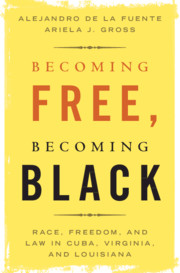Book contents
- Becoming Free, Becoming Black
- Studies In Legal History
- Becoming Free, Becoming Black
- Copyright page
- Contents
- Figures and Tables
- Preface
- Abbreviations
- Introduction
- Chapter 1 “A Negro and by Consequence an Alien”
- Chapter 2 The “Inconvenience” of Black Freedom
- Chapter 3 “The Natural Right of All Mankind”
- Chapter 4 “Rules … for Their Expulsion”
- Chapter 5 “Not of the Same Blood”
- Conclusion
- Notes
- Index
Chapter 4 - “Rules … for Their Expulsion”
Foreclosing Freedom, 1830–1860
Published online by Cambridge University Press: 16 January 2020
- Becoming Free, Becoming Black
- Studies In Legal History
- Becoming Free, Becoming Black
- Copyright page
- Contents
- Figures and Tables
- Preface
- Abbreviations
- Introduction
- Chapter 1 “A Negro and by Consequence an Alien”
- Chapter 2 The “Inconvenience” of Black Freedom
- Chapter 3 “The Natural Right of All Mankind”
- Chapter 4 “Rules … for Their Expulsion”
- Chapter 5 “Not of the Same Blood”
- Conclusion
- Notes
- Index
Summary
Chapter Four shows how slaveholding elites across jurisdictions responded to the growth of the free population of color during the Age of Revolution with fear and repression. They feared large-scale slave revolts, the rise of abolitionism, and the assertiveness of free people of color. Beginning in the 1830s, and with increasing fervor in the 1840s and 1850s, white slaveholding elites across the Americas sought to crack down on free people of color and manumission. They also looked for ways to remove free people of color from their midst through various “colonization” schemes, to realize the old dream of a perfect, and perfectly dichotomous, social order of blacks and whites, enslaved and free. This chapter explores the growing restrictions on manumission and free people of color in Louisiana and Virginia during the antebellum era, which stand in contrast to the significant but less successful efforts of Cuban slaveholders to limit the rights of free people of color. By 1860, these jurisdictions were on truly divergent paths concerning race and freedom. Black freedom was described as an anomaly or a legal absurdity in Virginia and Louisiana, but not in Cuba.
Keywords
- Type
- Chapter
- Information
- Becoming Free, Becoming BlackRace, Freedom, and Law in Cuba, Virginia, and Louisiana, pp. 132 - 177Publisher: Cambridge University PressPrint publication year: 2020

